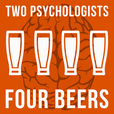Episode 14: Vices (with Elizabeth Page-Gould)

Summary: <p>Yoel and Mickey have their first repeat guest as Liz Page-Gould joins them to talk vices. Weed, booze and porn are all on the table (well, not literally) as we take on some popular vices. Why do you get paranoid when you smoke? Was alcohol really the impetus for agriculture? Is watching porn bad for your relationship? Bonus: learn who's watched porn in the last week.</p><p>Special Guest: Elizabeth Page-Gould.</p><p>Links:</p><ul> <li><a title="Rouge River Brewery" rel="nofollow" href="http://www.rougeriverbrewery.com/">Rouge River Brewery</a></li> <li> <a title="Adverse effects of cannabis - The Lancet" rel="nofollow" href="https://www.thelancet.com/journals/lancet/article/PIIS0140-6736(98)05021-1/fulltext">Adverse effects of cannabis - The Lancet</a> — Cannabis is the most widely used illicit drug in many developed societies. Its health and psychological effects are not well understood and remain the subject of much debate, with opinions on its risks polarised along the lines of proponents' views on what its legal status should be. An unfortunate consequence of this polarisation of opinion has been the absence of any consensus on what health information the medical profession should give to patients who are users or potential users of cannabis.</li> <li> <a title="CANNABIS AND SCHIZOPHRENIA A Longitudinal Study of Swedish Conscripts - The Lancet" rel="nofollow" href="https://www.thelancet.com/journals/lancet/article/PIIS0140-6736(87)92620-1/fulltext">CANNABIS AND SCHIZOPHRENIA A Longitudinal Study of Swedish Conscripts - The Lancet</a> — The association between level of cannabis consumption and development of schizophrenia during a 15-year follow-up was studied in a cohort of 45 570 Swedish conscripts.</li> <li><a title="GWAS of lifetime cannabis use reveals new risk loci, genetic overlap with psychiatric traits, and a causal influence of schizophrenia | Nature Neuroscience" rel="nofollow" href="https://www.nature.com/articles/s41593-018-0206-1">GWAS of lifetime cannabis use reveals new risk loci, genetic overlap with psychiatric traits, and a causal influence of schizophrenia | Nature Neuroscience</a></li> <li> <a title="Prevalence of Marijuana Use Disorders in the United States Between 2001-2002 and 2012-2013 | Adolescent Medicine | JAMA Psychiatry | JAMA Network" rel="nofollow" href="https://jamanetwork.com/journals/jamapsychiatry/fullarticle/2464591">Prevalence of Marijuana Use Disorders in the United States Between 2001-2002 and 2012-2013 | Adolescent Medicine | JAMA Psychiatry | JAMA Network</a> — Laws and attitudes toward marijuana in the United States are becoming more permissive but little is known about whether the prevalence rates of marijuana use and marijuana use disorders have changed in the 21st century.</li> <li> <a title="Long-term effects of exposure to cannabis - ScienceDirect" rel="nofollow" href="https://www.sciencedirect.com/science/article/pii/S1471489204001973?via%3Dihub">Long-term effects of exposure to cannabis - ScienceDirect</a> — The long-term use of cannabis, particularly at high intake levels, is associated with several adverse psychosocial features, including lower educational achievement and, in some instances, psychiatric illness. There is little evidence, however, that long-term cannabis use causes permanent cognitive impairment, nor is there is any clear cause and effect relationship to explain the psychosocial associations.</li> <li> <a title="Neuropsychological Performance in Long-term Cannabis Users | Adolescent Medicine | JAMA Psychiatry | JAMA Network" rel="nofollow" href="https://jamanetwork.com/journals/jamapsychiatry/fullarticle/481834">Neuropsychological Performance in Long-term Cannabis Users | Adolescent Medicine | JAMA Psychiatry | JAMA Network</a> — Although cannabis is the most widely used illicit drug in the United States, its long-term cognitive effects remain inadequately studied.</li> <li> <a title="How Alcohol and Caffeine Helped Create Civilization | HumanProgress" rel="nofollow" href="https://humanprogress.org/article.php?p=503">How Alcohol and Caffeine Helped Create Civilization | HumanProgress</a> — On the other hand, research suggests that alcohol may have helped create civilization itself. Alcohol consumption could have given early homo sapiens a survival edge. Before we could properly purify water or prepare food, the risk of ingesting hazardous microbes was so great that the antiseptic qualities of alcohol made it safer to consume than non-alcoholic alternatives — despite alcohol’s own risks. </li> <li> <a title="Trying Not to Try | Edward Slingerland" rel="nofollow" href="https://eslingerland.arts.ubc.ca/tryingnottotry/">Trying Not to Try | Edward Slingerland</a> — Trying Not to Try: Ancient China, Modern Science and the Power of Spontaneity</li> <li><a title="Pornography Consumption and Satisfaction: A Meta‐Analysis - Wright - 2017 - Human Communication Research - Wiley Online Library" rel="nofollow" href="https://onlinelibrary.wiley.com/doi/full/10.1111/hcre.12108">Pornography Consumption and Satisfaction: A Meta‐Analysis - Wright - 2017 - Human Communication Research - Wiley Online Library</a></li> <li><a title='Perceived Effects of Pornography on the Couple Relationship: Initial Findings of Open-Ended, Participant-Informed, "Bottom-Up" Research. - PubMed - NCBI' rel="nofollow" href="https://www.ncbi.nlm.nih.gov/pubmed/27393037">Perceived Effects of Pornography on the Couple Relationship: Initial Findings of Open-Ended, Participant-Informed, "Bottom-Up" Research. - PubMed - NCBI</a></li> <li><a title="Pornography and Impersonal Sex | Human Communication Research | Oxford Academic" rel="nofollow" href="https://academic.oup.com/hcr/advance-article-abstract/doi/10.1093/hcr/hqy014/5144985">Pornography and Impersonal Sex | Human Communication Research | Oxford Academic</a></li> </ul>